- Home
- Susanna Kearsley
Named of the Dragon
Named of the Dragon Read online
Named of the Dragon, by Susanna Kearsley
If you purchased this book without a cover, you should be aware that this book is stolen property. It was reported as "unsold and destroyed" to the publisher and neither the author nor the publisher has received any payment for this "stripped book."
The author would like to acknowledge the following source: R. J. Stewart and John Matthews, Merlin Through the Ages (London, 1995). Extracts from The Collected Works of W. B. Yeats, Volume I: The Poems, revised and edited by Richard J. Finneran, copyright 1928 by Macmillan Publishing Company, copyright renewed © 1956 by Georgie Yeats, reprinted with the permission of Scribner, a division of Simon & Schuster.
NAMED OF THE DRAGON
A Berkley Book / published by arrangement with the author
PRINTING HISTORY
First published in Great Britain 1998 by Victor Gollancz
Seal books edition / December 1998
Berkley edition / October 1999
All rights reserved.
Copyright © 1998 by Susanna Kearsley.
This book may not be reproduced in whole or in part, by mimeograph or any other means, without permission.
For information address: The Berkley Publishing Group, a division of Penguin Putnam Inc., 375 Hudson Street, New York, New York 100(4.
The Penguin Putnam Inc. World Wide Web site address is http://www.penguinputnam.com
ISBN: 0-425-17345-3
BERKLEY® Berkley Books are published by The Berkley Publishing Group, a division of Penguin Putnam Inc., 375 Hudson Street, New York, New York 10014.
BERKLEY and the "B" logo are trademarks belonging to Penguin Putnam Inc.
PRINTED IN THE UNITED STATES OF AMERICA 10 9876 5 4321
This one is for Ken
I
Shine, little lamp, nor let thy light grow dim.
Into what vast, dread dreams, what lonely lands,
Into what griefs hath death delivered him,
Far from my hands?
Marjorie Pickthall, "The Lamp of Poor Souls"
The dream came, as it always did, just before dawn. I was standing alone at the edge of a river that wound through a valley so lush and so green that the air seemed alive. The warble of songbirds rang over the tree-tops from branches bent low with the weight of ripe fruit, and everywhere the flowers grew, more vivid and fragrant than any flowers I had ever seen before. Their fragrance filled me with an incredible thirst, and kneeling on the riv-erbank I cupped my hands into the chill running water and lifted them dripping, preparing to drink.
A shadow swept over me, blocking the sun.
Beside me the grass gave a rustle and parted, and out came a serpent, quite withered and small. It slipped down the riverbank into the water and opened its mouth, and as I knelt watching, the serpent swallowed the river, and the flowers shrivelled and died and the trees turned to flame, and the songbirds to ravens, and everywhere the green of the valley vanished and the world became a wasteland underneath a frozen sky, and the riverbed a hard road winding through it.
And the serpent, grown heavy and large, slithered off as the ravens rose thick in a chattering cloud that turned day into night, and I found myself walking beneath a pale moon through the wasteland.
I was looking for something—I didn't know what, but I'd lost it just recently...
And then, far off, I heard a baby crying in the night, and I remembered.
"Justin!"
The crying grew stronger. I started to run, with my hair streaming out like a madwoman, running, but always the cry came from somewhere ahead and I couldn't catch up with it. "Justin!" I called again, panicked. "Oh God, love, I'm coming. Hold on, Mummy's coming."
But already I was losing him, I wasn't running fast enough, and then the road fell away and I fell with it, spiralling helplessly down through the dark into nothingness, hearing the cries growing fainter above me, and fading ...
I woke with a jolt.
For a long moment I lay perfectly still, blinking up at the ceiling and forcing my eyes to focus through the stinging mist of tears. Outside on the pavement I heard footsteps pass with the brisk, certain ring of a businessman heading for Kensington station. The sound, small and normal, was something to cling to. I drew a deep breath... and another ... reached my hand towards the lamp.
Light always helped, somehow.
Clear of the shadows, my room felt less cold and less empty. I rose, and shrugged myself into my robe, and crossed to the window. The sulphurous glow of a late-November night had given way to hard grey light that flattened on the line of roofs and chimney-pots that faced me. In the street below, the stream of morning traffic had already started, sluggishly, as everywhere the houses yawned to life. It was morning, just the same as any other morning.
I pulled the curtain back an inch, and looked towards the fading morning star. It looked so small, so vulnerable.
Another hour, and it would be forgotten. There wasn't anybody in the flat who could have heard me, but I spoke the words quite softly, all the same: "Happy Birthday, Justin," I said, to the tiny point of light.
It winked back, faintly, and I let the curtain fall.
II
Go hence to Wales,
There live a while.
William Rowley, The Birth of Merlin
Oh, Lyn, you can't be serious." Bridget Cooper flicked her auburn hair back in a careless gesture that distracted every man within a two-table radius, and glanced at me reprovingly. "You look like death warmed up, you know. The last thing you should do is take another transatlantic flight."
With anybody else, I might have argued that I'd slept straight through the New York flight two days ago, and that my next business flight wouldn't be until the twenty-first of January ... but with Bridget, I knew, I'd be wasting my breath. Besides, I'd known her long enough to realize this was simply preamble.
Bridget never worried about anybody's health except her own. And she never rang me at nine on a Monday, suggesting we meet and have lunch, unless she had a motive.
Bridget was a one-off, an exceptionally talented writer with a wild imagination that made her books for children instant classics, and a wild nature that drove the poor directors of my literary agency to drink. In the four years since I'd signed her as a client, Bridget's books had earned a fortune for the Simon Holland Agency, but her unpredictability had caused much tearing of hair and rending of garments among my colleagues. My favourite of her escapades—the day she'd kicked the BBC presenter—was now a Simon Holland legend. And I, who had survived four years and one week's holiday in France with Bridget, had risen to the status of a martyr.
Not that Bridget was so very terrible. In fact, if one didn't mind the occasional embarrassment, she could be tremendous fun, and time had taught me how to keep pace with her ever-shifting moods. Still, she did leave me wondering, sometimes, exactly who was managing whom.
Our lunch today had been a case in point. It had begun, reasonably enough, with a discussion of the plans for an animated television series based on the bestselling Llandrah books that had first launched Bridget's career. But by the time the waiter cleared away our starters, she had somehow shifted topics to the coming holidays.
"And anyway," she said, "who goes to Canada for Christmas?"
"Quite a lot of people, I'd imagine. All that snow ..."
"There won't be snow," she told me, very certain, "in Vancouver. Their weather's much too mild." Taking another slice of bread from the basket between us, she tore it neatly into pieces. "No, you ought to come with me, instead, to Angle."
"Angle?"
"Pembrokeshire," she said. "South Wales. You know, where they had that big oil spill a couple of years ago." Bridget's sense of geography was, I'd learned, invari
ably linked to the six o'clock news and the Sunday tabloids. Name any town or village and she'd pinpoint its location in relation to a murder or a scandal or a natural disaster. Odd, perhaps, but undeniably effective. As it happened, I did remember the oil spill in question, and my memory flashed an image of a rugged stretch of coastline as she took a bite of bread and went on speaking. "James is minding a lovely old house down there—well, it's sort of three houses, really, but two of them have been knocked together to make one—right by the sea, with an old ruined tower in the garden. You'd adore it. Anyway, he's asked me for the holidays, and he said I could bring you along, if you wanted to come."
I didn't bother asking her who "James" was—I'd long since given up trying to keep track of Bridget's men. I simply shook my head, shifting aside so the waiter could set down my plate of risotto with fragrant spiced pumpkin. "I couldn't, I'm afraid. My brother would never forgive me."
She glanced up, clearly finding my excuse inadequate. "And how is dear Patrick the Protester? What's he on about this week? Saving the dormice? Blocking the bypass?"
"Battling the logging industry, actually. Chaining himself to trees. But only at the weekend," I explained. "He doesn't have so much free time, now he's married."
"Ah." Losing interest, Bridget took an experimental taste of her own dish of brightly coloured pasta, chasing it down with a sip of red wine. "Mm, that's glorious. I ought to marry an Italian, they do brilliant things with food." The Italian waiter, hovering nearby, looked briefly hopeful, and I hid my smile with an effort, marvelling again at the effect that Bridget had on men.
She was not, on close inspection, a beautiful woman. She had an ordinary figure, an ordinary nose dusted with freckles, an ordinary smile, and tilting eyes too impish to be called exotic. My brother, having met her, thought her "cute" rather than "pretty," though even he admitted Bridget had a certain something that was ... well, it simply was. I blamed it on the auburn hair, myself. To believe a person's hair colour could shape their personality might seem, at first glance, less than scientific, but I'd never met a redhead yet who didn't have the same allure—a sort of blend of vibrant energy and freshness that made those of us with brown hair feel ridiculously dull.
I smiled. "I thought you'd sworn off marriage."
"So I have," she said, remembering. "I'm thirty-four now, far too sensible to fall into the trap. And two ex-husbands ought to be enough for anyone. D'you know, that's one thing that I've always envied you."
"What's that?"
"Well, I'd rather be widowed, I think, than divorced. It's much tidier. Nobody skulking round, trying to make your life a misery. You're rather lucky, that way."
Only Bridget, I decided, would have thought to tell a widow she was lucky that her husband hadn't lived. But her candid words, as usual, were not far off the mark. My marriage to the novelist Martin Blake had not been the greatest of successes.
"I sometimes wish," said Bridget, "that my number one would drive his car into a handy tree. He's being a right pain, lately. I'll be that relieved to get away for the holidays. And Dylan Thomas notwithstanding, I'm frankly seduced by the thought of a Christmas in Wales—especially the singing ... d'you remember that Welsh choir we heard at the Albert Hall? Magnificent," she pronounced them. "I mean, how can one not admire a people who can sing like that?"
I smiled into my wineglass, thinking how my own assistant Lewis, who was Welsh, would have cringed to hear her say that. He frequently despaired of the stereotypes attached to his countrymen. "Singing, coal-mining, rugby and sheep," he'd told me once, in great disgust, "are the only things the bloody English think we know. Pure ignorance."
Bridget took another piece of bread and sighed. "I do wish you'd come. Fond as I am of James, he can be such a bore, sometimes. You'd be a good distraction for him."
"Oh, yes?"
"What I mean is, you'd be someone new that he could tell his stories to. They're fascinating stories, first time round. And I thought, since you waxed so rhapsodic about his last novel..."
My fork paused in mid-air. "I did?"
"Of course you did, don't you remember? When it didn't win the Booker, you called the judges a pathetic bunch of—"
"Bridget," I interrupted her carefully, setting down my fork, "this 'James' of yours... he wouldn't be, by any chance..."
"James Swift," she said, with a confirming nod.
I felt a sudden need for water. Reaching for my glass, I calmed the tiny racing thrill along my nerves that always signalled my professional excitement. "James Swift," I repeated the name, to be absolutely certain we were speaking of the same man—the man whose latest novel should have won the Booker prize; the man who, I felt firmly, was the closest thing to literary genius that our nation now had living. "I didn't realize you two knew each other."
Bridget's mouth curved, full of mischief. "One doesn't tell one's agent everything," she said. "You're far too young. And anyway, I know how much you fancy his writing—I didn't want you pestering the poor man to defect to Simon Holland."
"Give over," I told her, "I'm hardly the pestering type. And I'm not so short on ethics that I'd try to lure an author from the agent he's already got."
"I see," said Bridget. "So you wouldn't want to know, then, that he's not exactly happy with his agent." She twirled up a forkful of pasta, the picture of innocence. "Or that he's thinking he might look round for a new one ..."
"You are joking."
She smiled, sensing victory. "Are you sure you'd rather go to Canada for Christmas?"
"You really don't have any scruples, do you?"
"God, no. Horrible things, scruples," she said, with a shudder. "They get in the way of my fun." Reaching to refill her wineglass, she tested the weight of the bottle. "Nearly empty. We'd best have another."
"Oh, Bridget, no, I can't..."
But she'd already raised her hand to hail the waiter, who all but leaped across his other tables to reach ours, arriving slightly out of breath and wearing his most charming smile. Bridget, being Bridget, took no notice, though she did spare him an admiring look as he scurried off again to fetch her order. "The service here is really somediing, isn't it?" she asked; then, seeing my expression, raised an eyebrow. "What?"
"Nothing." I let it pass. "Only I can't drink any more wine, I've reached my limit. Some of us," I reminded her, "have to go back to the office."
"Yes, I know." Upending the first bottle over my wineglass, she poured out the dregs. "And it wouldn't help my reputation any, if I let you go back sober."
She needn't have worried. Her reputation was already unassailable. So much so that, two hours later, as I leaned against the cool mirrored wall of our office lift, my co-worker Graham had no trouble guessing the cause of my unsteadiness. "Been to lunch with Bridget Cooper?"
"Mm." I kept my eyes closed while I nodded. "That obvious, is it?"
"Well, at least you managed to find your way back to the building," he congratulated me. "The last time I had lunch with her I ended up in Soho, doing most peculiar things with women's clothing."
"Did you really? I'd like to have seen that."
"I'm sure it's all on video, somewhere." The lift stopped with a shudder and Graham took my elbow as the doors slid open.
"Not my floor," I slurred.
"Yes, I know, but I can't let you go upstairs in that condition. You'll have to hide out in my office, till you get your second wind."
Graham's spacious office, one floor below mine, was the war room of our film and television rights department. My bookshelves only had to bear the weight of books by my own clients, but Graham's shelves were stacked to overflowing with a dizzying collection of typescripts and bound proofs and published books, his wall-mounted schedules and half-buried desk completing the picture of organized chaos.
Ignoring the clutter, I sank into the cushions of the love seat in the corner, pushing aside a stack of catalogues so I could prop my feet up on the coffee table.
"Tea or coffee?" Graham offered.
<
br /> "Tea sounds heavenly."
"Right," he said, and left me, returning several minutes later with two cracked and battered mugs. I'd just begun to drift, eyes closing, and the heat of the mug being thrust into my hands came as a bit of a jolt, but the fragrant steam revived me.
I took a sip and thanked him. "You're an angel."
"That's hardly the image I'm after," he said, with a smile, as he settled himself in his own padded chair. "I'd rather be seen as the devil incarnate—I get more accomplished, that way."
"Yes, I heard you'd been terrorizing my poor assistant, lately."
"Vicious rumours," he denied it. "Speaking of which, I don't suppose Bridget happened to confirm or deny her affair with that Formula One chap? No? Damn. I've got ten quid riding on that one." Swivelling his chair round, he faced me expectantly. "So, what's her opinion of the Llandrah series?"
"I think she likes it. She seemed quite happy they were wanting Julia to oversee the animation." That had been one of my concerns, as well as Bridget's. Julia Beckett's original illustrations for the Llandrah books had been so very beautiful that they'd become a living part of Bridget's text, and neither of us could envisage the stories being told without those same distinctive images.
"Yes, well, Julia is rather irreplaceable," said Graham, with a sigh. "Horrible shame that she went and got married—I'll never understand the female mind."
"She's very happy."
"No doubt." With a shrug that dismissed the irrational nature of women, he returned to the topic at hand. "So you think Bridget's pleased with the deal?"
"I think so, yes."
"But you're not sure."
"Well, we sort of got sidetracked," I explained, raising one hand to massage the veins pounding time at my temples. "You know Bridget. One minute we're discussing the contract, and the next I'm hearing all about her Christmas plans,"

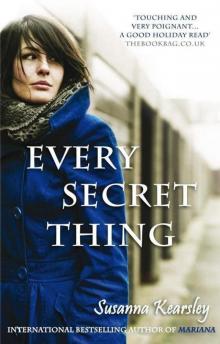 Every Secret Thing
Every Secret Thing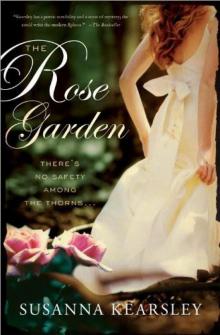 The Rose Garden
The Rose Garden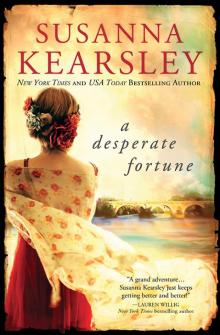 A Desperate Fortune
A Desperate Fortune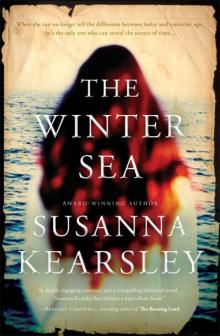 The Winter Sea
The Winter Sea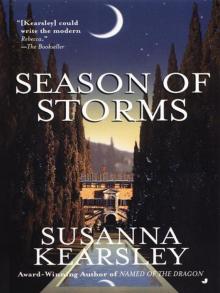 Season of Storms
Season of Storms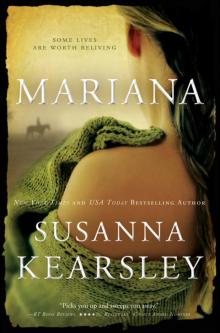 Mariana
Mariana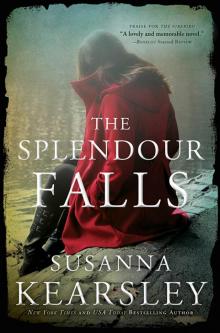 The Splendour Falls
The Splendour Falls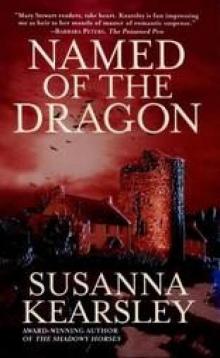 Named of the Dragon
Named of the Dragon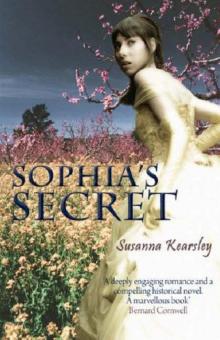 Sophia's Secret
Sophia's Secret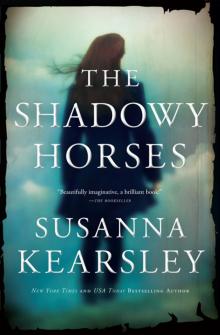 The Shadowy Horses
The Shadowy Horses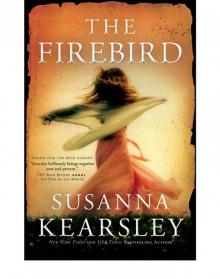 The Firebird
The Firebird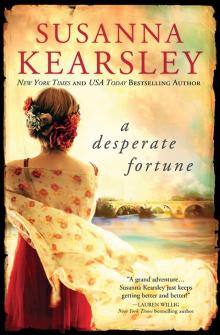 Desperate Fortune
Desperate Fortune